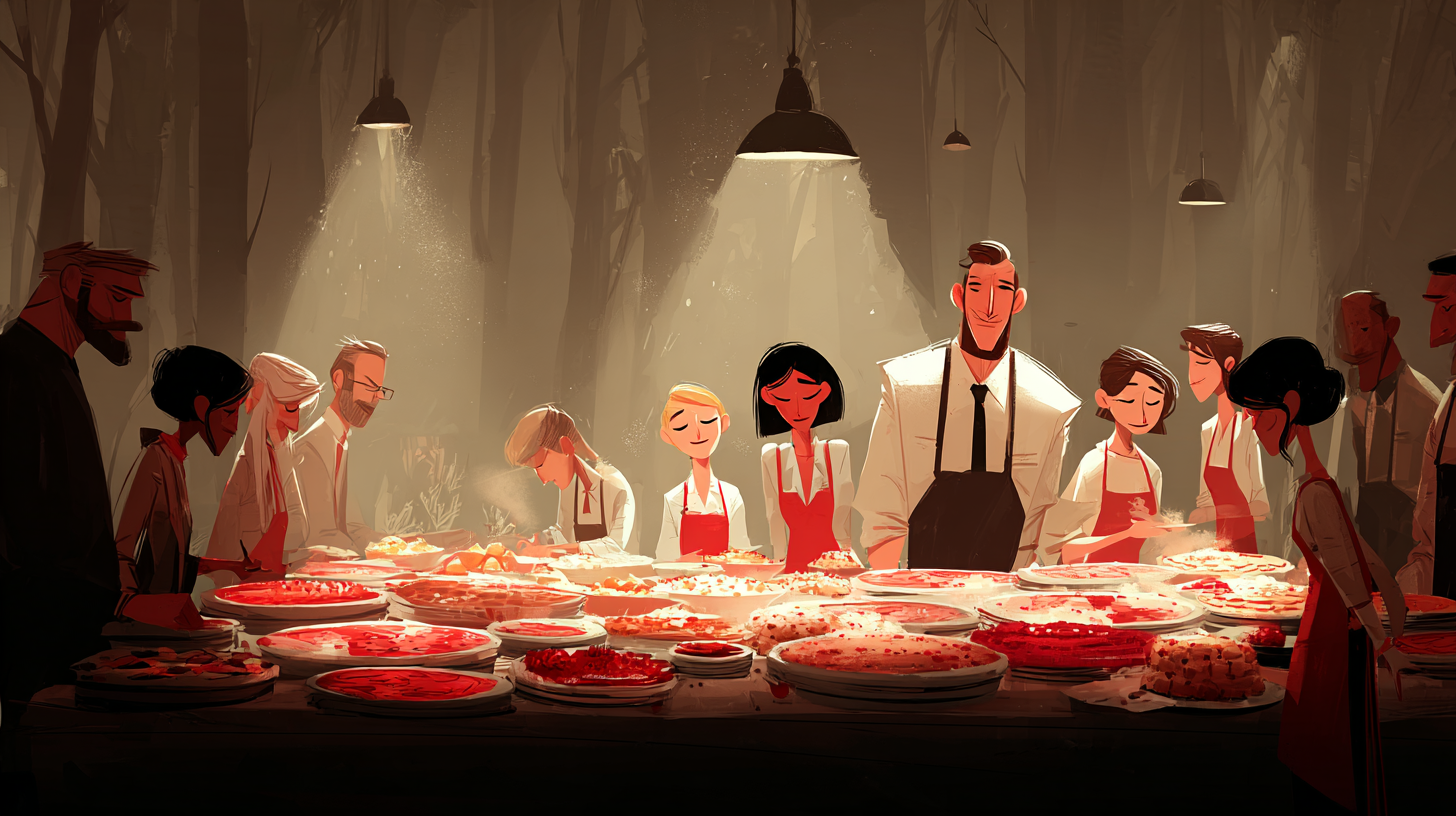dish means “food on a plate” or “a plate itself”.
dish は「料理」や「皿」を意味する言葉
以下は英単語 “dish” に関するストーリー型学習コンテンツです。まずは大枠の意味を理解して最後の文章で確認しましょう。
主な意味(main meaning)
| 品詞 | 意味 | 発音記号 (IPA) | 英語例文 |
|---|---|---|---|
| 名詞 (noun) | 料理、皿 | /dɪʃ/ | This restaurant serves a special pasta dish. |
| 名詞 (noun) | (パラボラ)アンテナ | /dɪʃ/ | He installed a satellite dish on the roof. |
| 動詞 (verb, 口語) | 盛り付ける、(食べ物を)よそう | /dɪʃ/ | She dished the soup into the bowls. |
語源(etymology)
古英語 disc(皿)から来ており、さらにラテン語 discus(円盤)に由来。
核イメージは「丸いものに盛られたもの → 皿 → 料理」。
類義語(synonyms)
| 類義語 | 意味 | 例文 |
|---|---|---|
| plate | 皿 | She put the cake on a small plate. |
| bowl | ボウル、深皿 | He ate soup from a large bowl. |
| meal | 食事 | They had a delicious meal together. |
| cuisine | 料理、料理法 | Italian cuisine is popular around the world. |
反義語(antonyms)
| 反義語 | 意味 | 例文 |
|---|---|---|
| hunger | 空腹 | After a long day, he felt strong hunger. |
| starvation | 飢え | Many people suffered from starvation during the war. |
コロケーション(collocations)
| コロケーション | 例文 |
|---|---|
| main dish | The main dish was grilled chicken. |
| side dish | Rice is often served as a side dish. |
| prepare a dish | She prepared a dish of curry for her family. |
| special dish | This is the chef’s special dish today. |
2項表現(binomials)
| 2項表現 | 例文 |
|---|---|
| dish and plate | The waiter carried many dishes and plates. |
| knife and dish | He placed a knife and dish on the table. |
英語ストーリー(english story)
Story: “The New Dish at the Office Party”
It was Friday evening, and everyone in the office was excited because the manager had organized a small party in the meeting room. Each employee was asked to bring one dish. Some people looked nervous because they were not very good at cooking, but others seemed confident.
Emma decided to prepare her favorite pasta. She worked hard the night before and made sure the main dish was both delicious and beautiful. She also brought a small side dish of salad. When she arrived at the office, she carefully placed her food on a large plate so that everyone could enjoy it.
David, on the other hand, had no time to cook. He quickly bought sushi from a Japanese restaurant. “This is my special dish,” he joked, even though everyone knew he had just bought it. Still, people laughed and enjoyed it.
During the party, people compared their food. “Your pasta is great,” said Linda. “I can taste the Italian cuisine.” Emma smiled proudly.
Another colleague, Mark, brought soup in a big bowl. He said, “I wanted something warm for everyone.” People appreciated it, especially since the evening was cold.
While eating, the employees started talking about different foods around the world. Some mentioned their favorite meals when traveling. Others talked about times they had suffered from hunger when they had forgotten to eat lunch during busy workdays. One person even shared a sad story about seeing starvation on a volunteer trip abroad.
At one point, Peter made a funny mistake. He placed his spoon on a dirty dish and plate, and someone joked, “You need a knife and dish instead!” Everyone laughed again, and the mood stayed light and cheerful.
By the end of the evening, the manager said, “This party shows that food brings us together. Whether it is a homemade meal, a side dish, or something from a restaurant, every dish tells a story.” Everyone agreed and promised to hold another party next month.
The employees went home with happy memories, full stomachs, and a stronger bond with their colleagues. Emma felt especially proud that her pasta had been one of the most popular dishes. She thought to herself, “Maybe I should cook more often.”
和訳
「オフィスパーティーの新しい料理」
金曜日の夕方、会社ではみんながワクワクしていました。マネージャーが会議室で小さなパーティーを開いたからです。社員一人ひとりが一つの**料理(dish)**を持ってくるように頼まれていました。料理が苦手で不安そうな人もいれば、自信にあふれている人もいました。
エマは大好きなパスタを作ることにしました。前の晩に一生懸命準備し、その**メイン料理(main dish)が美味しく見た目も良いように工夫しました。また、小さな副菜(side dish)のサラダも持っていきました。オフィスに到着すると、大きな皿(plate)**に料理を並べて、みんなで食べられるようにしました。
一方、デイビッドは料理する時間がなく、日本料理店で寿司を買いました。「これは僕の**特別料理(special dish)**だよ」と冗談を言いました。みんなが買ったものだとわかっていましたが、それでも笑って楽しんでいました。
パーティー中、人々は互いの料理を比べました。「あなたのパスタ美味しいわ」とリンダが言いました。「イタリアの**料理(cuisine)の味がするわ。」エマは誇らしげに笑いました。
同僚のマークは大きなボウル(bowl)**にスープを入れて持ってきました。「みんなに温かいものを食べてもらいたかったんだ」と言うと、人々は寒い夜にとても感謝しました。
食事をしながら、社員たちは世界中の食べ物について話し合いました。旅行での一番好きな**食事(meal)を語る人もいました。忙しい仕事の中で昼食を忘れ、強い空腹(hunger)を感じた経験を話す人もいました。ある人は海外のボランティア活動で見た飢え(starvation)**の悲しい話をシェアしました。
あるとき、ピーターが面白い失敗をしました。汚れた**皿とお皿(dish and plate)**にスプーンを置いてしまったのです。すると誰かが「**ナイフと皿(knife and dish)**が必要だよ!」と冗談を言い、みんな大笑いしました。
最後にマネージャーはこう言いました。「このパーティーは、食べ物が人をつなげるということを示してくれました。手作りの料理でも、副菜でも、レストランで買ったものでも、どんな料理にも物語があります。」みんなが同意し、来月もう一度パーティーをしようと約束しました。
社員たちは満腹と楽しい思い出、そして同僚との絆を深めて家に帰りました。エマは特に、自分のパスタが一番人気だったことに誇りを感じました。「もっと料理してみようかな」と心の中で思いました。
Q&A
Q: dish と plate の違いは何ですか?
A: dish は「料理そのもの」や「皿」を意味しますが、plate は基本的に「平たいお皿」だけを指します。例えば “a pasta dish” は「パスタ料理」ですが、“a pasta plate” とは普通言いません。
Q: dish と bowl の違いは何ですか?
A: dish は料理全般を表せますが、bowl は「深い器」を指し、スープやシリアルなど液体を入れるときに使います。つまり bowl は容器の形に焦点があり、dish は料理の中身に焦点があります。
Q: dish と meal の違いは何ですか?
A: dish は「一品の料理」で、meal は「朝食・昼食・夕食などの食事全体」を指します。例えば “a chicken dish” は「鶏肉料理の一皿」、一方 “a chicken meal” は「鶏肉が中心の食事全体」というイメージです。
Q: dish と cuisine の違いは何ですか?
A: dish は具体的な一品料理を指すのに対し、cuisine は「料理法」や「国の料理文化」を表します。例えば “French cuisine” は「フランス料理全般」、「a French dish」なら「フランス料理の一皿」となります。
Q: main dish と dish の違いは何ですか?
A: main dish は食事の中心となるメイン料理のことです。dish 単独だと「一品料理」全般を意味し、メインか副菜かは特定されません。
Q: side dish と dish の違いは何ですか?
A: side dish はメイン料理を補う付け合わせのことです。サラダやポテト、漬物などが例です。dish はそれを含めた全体を広く指します。
Q: special dish と dish の違いは何ですか?
A: special dish は「特別料理」や「おすすめの一皿」を意味します。レストランのおすすめメニューや家庭でのおもてなし料理に使います。単なる dish だと「料理」全般で、特別感はありません。
Q: prepare a dish と dish の違いは何ですか?
A: prepare a dish は「料理を作る」という動作を表します。一方、dish 単独だと「料理(名詞)」です。つまり、前者は動作、後者はもの自体を指しています。
こうした違いを整理すると、「dish」は広い意味で「料理」や「皿」を表し、それに対して他の語は「器の形(plate, bowl)」「食事全体(meal)」「料理文化(cuisine)」など、特定の観点にフォーカスしていることが分かります。



コメント